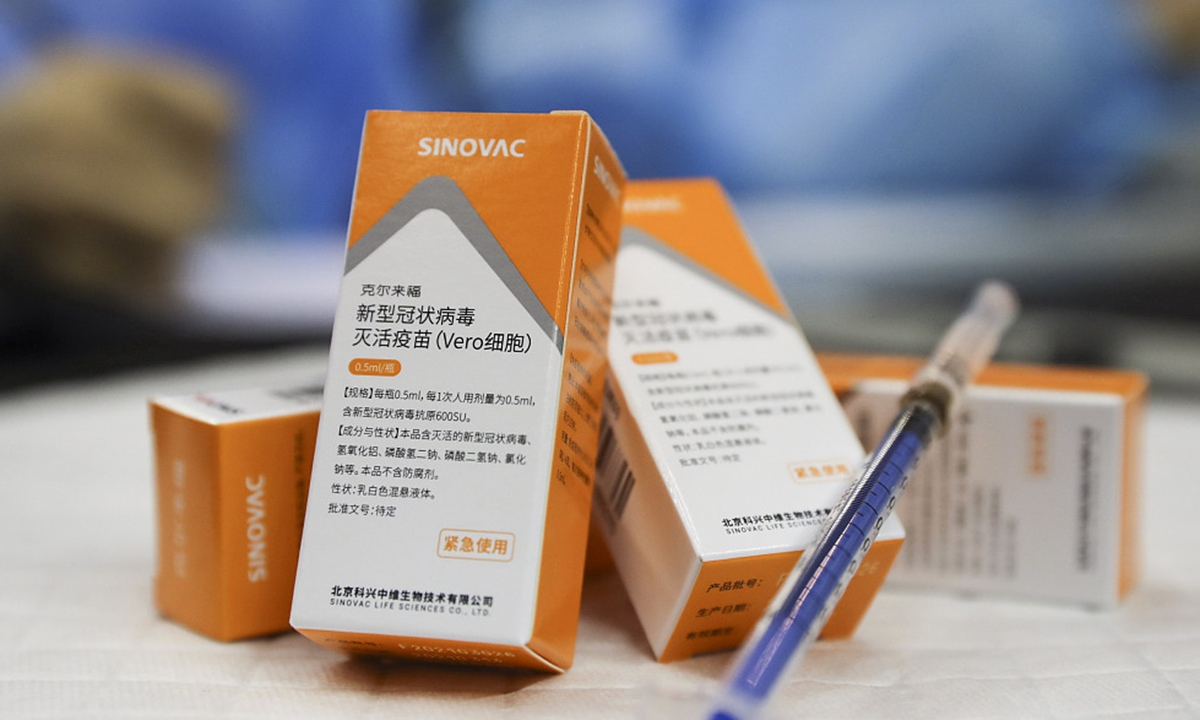
Sinovac vaccine Photo: VCG
Researches conducted at home and abroad and joint efforts of different disciplines are needed in terms of the studies on the vaccines, antibodies and medicines against Omicron variant, since there is still little knowledge about the variant, said China's top respiratory expert Zhong Nanshan on Saturday.
There is still little knowledge about the spread of the disease, its pathogenesis and early pathological and physiological development after infections, and the therapeutic target of the disease, Zhong noted during the Greater Bay Science Forum 2021 in Guangzhou, South China's Guangdong Province.
According to Zhong, many countries have gradually realized that China's practice against COVID-19 has been correct over the past two years. They have also adopted very strict management and control measures against the variant early when only more than 10 cases of Omicron were identified in those countries last month.
Meanwhile, with the rapid development of gene engineering, protein engineering, molecular biology and other disciplines, human beings can finally map the human genome and complete gene sequencing through scientific researches, which play a key role in disease detection, development and early intervention, Zhong noted.
Thanks to the scientific research achievements of countless predecessors in the field of life sciences in recent years, China has gained a much faster and more accurate understanding of the COVID-19 virus than that of the SARS virus 18 years ago, Zhong said.
Zhong is confident that inoculation rate in China can reach 83 percent by the end of this year to realize herd immunity. As of Friday, a total of 1.15 billion Chinese people, accounting for 81.9 percent of the nation's population, have been vaccinated.
Zhong also stressed the importance of booster shots at the forum. Apart from the lab data which showed that booster shots worked, there are also real-world data showing that after a third dose shot, the protection of symptomatic cases increased from 56 percent to 80 percent.
Also on Saturday, Sinovac said that it cooperated with the research team led by professor Qin Chuan, director of the Institute of Laboratory Animal Sciences, Chinese Academy of Medical Sciences & Peking Union Medical College and launched studies on full gene sequencing and work on virus strain isolation. Researches on the mutated variant have been launched as well.
The company obtained on December 5 the specimens of nasopharyngeal swabs of an infected individual who contracted the Omicron variant with the assistant and support from the related departments from the mainland government and the Hong Kong SAR government.
Moreover, with a cooperation agreement signed separately by the company with the research team led by Yuen Kwok-yung from the University of Hong Kong, the samples of the Omicron were delivered to Beijing last Thursday and researches on the variant have been launched at the P3 laboratory of the Institute of Laboratory Animal Sciences, Chinese Academy of Medical Sciences & Peking Union Medical College.
After obtaining the mutant strain, Sinovac can better secure the researches on the cross-neutralization tests of vaccines and the screening of virus strains for vaccines, in a bid to understand the impact of the Omicron variant on existing COVID-19 vaccines and further evaluate the necessity for the development of vaccines against Omicron.
Global Times




